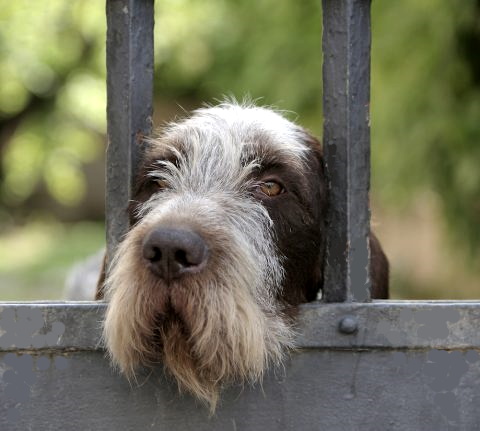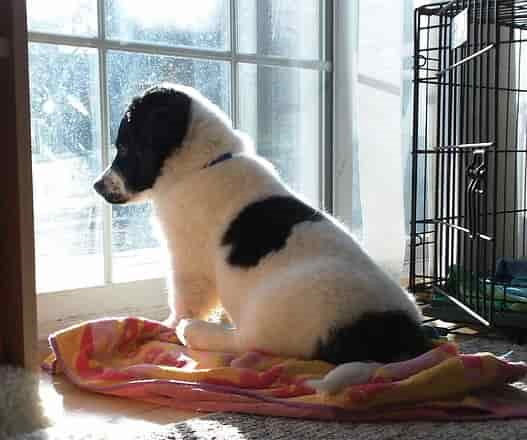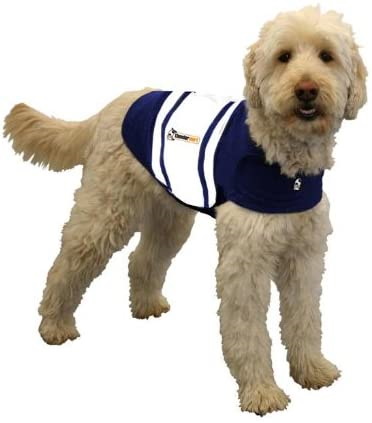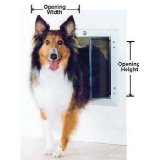Separation Anxiety In Dogs
Does Your Dog Have It?
Separation anxiety in dogs is not simply the result of being left home alone. There are usually other underlying reasons for the problem behaviors that occur when an owner walks out the door.
 Home Alone
Home AloneOnce these are discovered, preventative measures can be put in play.
One thing to note: The dog may not be the only one with a problem!!
But let's start at the beginning.
Signs of Dog Anxiety
Separation anxiety in dogs is generally expressed in one or more problem behaviors that occur when they are left home alone. Here are some of the more typical signs you may see when getting ready to leave the house:
- Your dog seems highly agitated.
- He follows you around
- Starts barking to relieve emotions
- Exhibits the stressful reaction of salivating
- He may even act excited if he thinks he is going too!
Possible Behaviors While You're Away
And, while you are away...- Destructive chewing of your possessions or furnishings
- He has a barking fest
- Becomes a whiner
- May have some "accidents"
- If left outside, may find a way to escape
- Or, re-landscapes the yard!

What is going on here?
Many of these behaviors are a result of the stress he is experiencing.
When Rover has no social outlet for long periods of time, he can feel confused, isolated, and literally have a panic attack.
Looking at it from a dog's point of view, dogs love company. They are
very social beings. Remember they had a lot of company in their original
pack environment. The man/dog relationship can be so close that the dog
never wants to leave your side.
Triggers For Separation Anxiety
Here's an example of a scenario that could trigger separation anxiety in dogs:
- You just spent the entire weekend with your dog. You had fun taking him along with you to the beach or park.
- You went on leisurely long walks. You played fetch in the yard. You took him out to the local coffee shop.
- In a word...he was your spoiled doggie...you were best friends!
Now You See Me, Now You Don't...
No, it's not hide and seek - it's Monday - as in back to work! Rover
doesn't realize it yet. He's bouncing around and ready to have some more
fun. Until he notices some familiar signs that you're getting ready to
leave - without him!!!
So off you go, leaving your dog behind to while away the many hours until you return.
Many a pet reacts to this state of solitary confinement by becoming stressed, anxious,
bored and depressed which can lead to destructive activity, barking, urinating and even chewing themselves.
Studies reveal that dogs get depressed just as we do and it is
one of the symptoms very often connected with separation anxiety. Under
these conditions dogs may become more aggressive, or just the opposite -
become more quiet and withdrawn.

What's Causing Your Dog's Separation Anxiety?
While we can't say specifically what's causing your dog's anxiety, here are a few possibilities :
- Remember how we mentioned early on that part of
the problem may have something to do with owner's themselves? Well, no
offense meant, but consider this:
Owners sometimes coddle their pets to the point where their leadership is not strongly evident. When this happens it's easy for the pet to see himself as the pack leader. In other words, he's in charge not you! Not an ideal situation!
When you're seen as a pack member as opposed to a leader, you can't just up and go as you please. In your dog's mind, he's responsible for you and when you take off, stress - as in dog anxiety, sets in.
- Changes in family routine or schedule. Dogs are creatures of habit and may become unsettled when things change and react in negative ways.
- Overly submissive or insecure dogs are more prone to acting out when left alone.
- Any dog who has previously been abandoned, or one who has experienced some kind of trauma while alone, may have residual anxiety attacks.
- Moving to a new location. Unfamiliar surroundings and all the uncertainties associated with moving may trigger temporary separation anxiety.
- Economic changes where everyone now has to leave for a job each day. In cases like this, the anxiety may only be temporary while the pet adjusts to being alone.
Ways To Deal With Separation Anxiety In Dogs
So, what can we do to reduce Rover's stress and help keep up his spirits while we are away? Give him his own job for one thing, as in something to occupy his time alone, including mental stimulation.
- Learn how to be a strong pack leader, so that he won't feel responsible for you while you are gone.
- Invest in some Interactive Toys - Such As:
- Treat-filled ones are irresistible and keep Rover busy for quite a while
- Ones that bounce use up energy and some even have dental ridges to clean your dog's teeth, as an added bonus.
- Then there are talking dog toys that engage the mind
Condition Your Dog For Alone Time
Here are some other ideas to diffuse your dog's anxiety:
- Install a hi-tech electronic doggie door leading to a small and secure outside area giving him a way to get out in an emergency or just for breath of fresh air.
- Exercise your dog thoroughly before going to work to help him feel more relaxed while you're gone. Then give him another workout when you get home.
- Call him on the phone and talk to him over the answer machine.
- Engage the services of a doggie walker for a mid-day walk.
- Take him to doggy daycare one day a week or more.
- Consider using dog pheromones - a product that is helpful in calming anxious or fearful pets.
- Make sure he has a den (crate) to curl up in to give him a feeling of security.
Some Unique Calming Tips
One of the holistic pet treatments for separation anxiety in dogs is acupuncture . Most holistic veterinarians
offer this type of treatment and it is said to be very effective.

A favorite tip of ours that can really help an anxious dog stay calm, is to play music. You've probably experienced the calming effect music can have on your own emotions. And it works for dogs too.
Studies done in several animal centers in England have confirmed that
soothing music, has a positive effect in calming our canine friends in
situations when they are feeling anxious or stressful. This can be from
the stress and isolation home alone dogs feel, or other triggers such as
strange or loud noises in the neighborhood, thunderstorms, other dogs
barking, mailmen ringing the
doorbell etc.
Many veterinarians, animal experts and doggie daycare centers are now
endorsing this information and using music to help doggies be more
relaxed and lose the blues. You can try it too if you are dealing with
separation anxiety in dogs. Give it a try with your home alone dogs.
We'd like to hear from you if this
article has been of help to you and any other topics you'd like us to cover.
NOTE: It is always a good safety measure to test toys under your supervision before leaving your dog alone with them.







